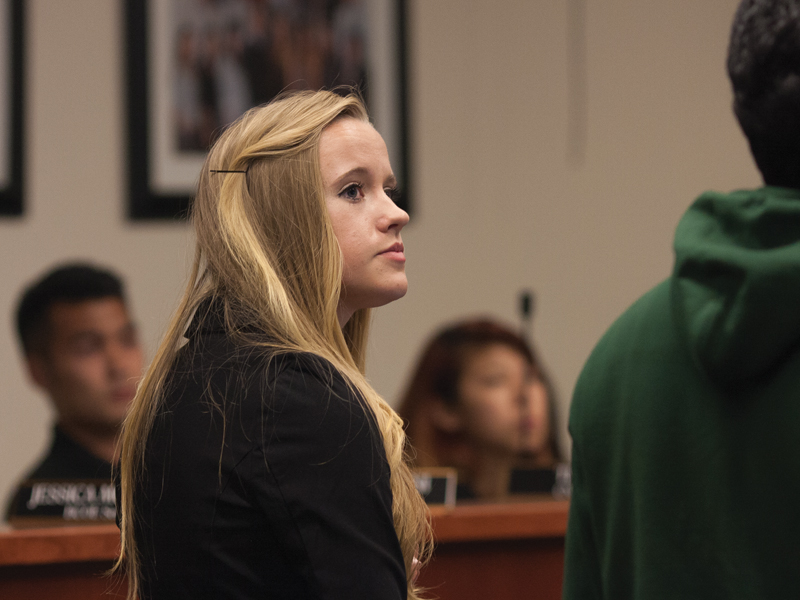
In the heightened spirit of the last meeting of the year, senators unanimously passed a resolution that would support the implementation of gender studies requirement courses at UCR. Dubbed Senate Resolution 25 (SR 25), this proposal will now be presented to the Academic Senate for final approval.
This resolution passed after a rousing presentation by incoming senator Summer Shafer and liaison to the Women’s Resource Center Malhar Shah on the necessity of a gender studies requirement for UCR and the availability of courses to meet the new requirement. The presentation offered visceral statistics to support the need for the resolution such as the fact that 95 percent of sexual assaults go unreported on college campuses. Shah and Shafer challenged the senators to see this rape phenomenon as preventable through the force of education.
“Too many students are too sure of what gender and sexuality is. This often leads to prejudices and misconceptions. The gender and sexuality courses will give them the tools to engage (with these topics) and ask questions,” said Shah.
Shah and Shafer’s solution aimed to make the breadth requirement easy on UCR students. The requirement, if adopted, would only apply to incoming freshmen so as to not delay graduation time for any currently enrolled students. They also anticipated opposition that the new requirement would delay graduation by making the gender studies course part of the additional humanities and social sciences elective which all colleges require students to take. This requirement is usually fulfilled already by a philosophy, religious studies, or women’s studies course; the new resolution would simply ensure that the required course dealt with gender and sexuality.
Shah and Shafer went through hundreds of course descriptions and asserted that over 200 courses offered at UCR already engage gender and sexuality on a comprehensive level. These courses are in many different departments such as English, media and cultural studies, and anthropology. To fulfill the requirement, a student would just have to pick a course which interested them.
“(The gender studies requirement) would basically be a mirror to the ethnic studies requirement,” clarified incoming vice president of external affairs Abraham Galvan.
“Let’s make a change,” Shafer concluded. “Let’s educate our students on the misconceptions of gender and sexuality.”
The public forum reaffirmed the support for this new requirement. Professor of English, co-chair of the department of LGBT studies at UCR and director of the Queer Lab Jennifer Doyle was confident that this proposition was feasible, noting that there is an abundance of faculty at UCR who teach courses that engage with gender and sexuality.
Doyle further expanded on the courses that can be offered based on diverse fields in education, political science, economics and public policy, along with gender issues and the workplace. “Gender studies is about a lot of things — not only sexual violence,” she said. “A course on Beyonce or Selena might meet this requirement, as might a course on RuPaul and contemporary drag culture or a course on masculinity and sports.”
Galvan and incoming vice president of internal affairs Fernando Echeverria vowed to personally ensure that this resolution is pursued next year and are also looking into expanding the gender studies requirement so that it applies to the entire UC system.
Other notable items on the agenda:
Members of ASUCR also approved changes to the ASUCR Elections Code which was often scrutinized during the 2013-14 elections this year. The elections bylaws required candidates to have a 2.0 cumulative GPA and good standing with the university, yet does not set a specific quarterly GPA requirement.
Senators debated whether they should make the GPA requirement apply only cumulatively rather than only the quarter prior to the campaign season.
Galvan supported only a cumulative GPA requirement, which he felt was less exclusionary and geared more toward nontraditional students, who were more likely to have “fluke” quarters where they underperformed.
By the end of the meeting, the election bylaws were updated to state that any candidate running for office must have a 2.0 minimum GPA (both quarterly and culmulatively) to align with the university’s official policies on “good standing.”
Any candidate must also be enrolled in at least 12 units for all quarters of the campaign. If campaigning extends beyond one quarter, then eligibility (including GPA verification) will be reassessed.
Another change that was made involved specifying the time required to verify the GPAs on submitted candidate applications. The Elections Code reads, “The ASUCR Executive Director must inform the Elections Director of ineligible candidates after the application deadline. The Elections Director must then contact ineligible/disqualified candidates immediately in writing,” but the change clarifies when candidates will be informed about their eligibility.








